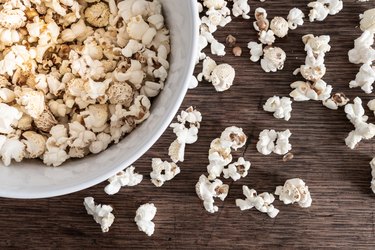
You enjoy sitting down with a big bowl of tasty popcorn, although you're a bit concerned about popcorn calories. You also want to learn about popcorn nutrition, along with tasty ways to nosh on this crunchy snack. Explore several ideas for incorporating popcorn into a healthy diet.
Tip
With minimal calories, plus essential nutrients and respectable fiber content, air popped popcorn is one of the healthiest snacks around. For extra popcorn nutrition, add a protein such as meat, cheese or peanut butter.
Video of the Day
View Popcorn Nutrition Benefits
Eating a handful (or two) of popcorn can provide you with a lot of nutrients and fiber. First, popcorn is a desirable whole grain, which means it contains all parts of the corn kernel, states the University of Nebraska-Lincoln.
Video of the Day
As an added bonus, it's easy to integrate popcorn into your healthy eating plan. With just 30 calories per cup of air popped popcorn, and 35 calories for the oil popped version, popcorn makes a terrific treat or on-the-go snack. In other words, popcorn calories shouldn't be a major concern.
If you're always on the lookout for good whole grain sources, add popcorn to your list. In fact, the Popcorn Board notes that one popcorn serving has about 70 percent of your daily whole grain intake. As a completely unprocessed whole grain, popcorn kernels remain structurally intact, potentially providing you with added nutrients.
Speaking of beneficial nutrients, popcorn contains nine essential vitamins and eight minerals, giving it a well-rounded nutrient profile. With desirable complex carbohydrates and useful fiber, and no preservatives, popcorn can be a healthy addition to your pantry.
Finally, plain air popped popcorn contains zero cholesterol, and only has 0.1 gram of fat per one-cup serving. Plus, the popcorn calories shouldn't make a huge impact on your daily calorie budget.
Additionally, Michigan State University Extension points out that this nutritious whole grain is gluten free, and is considered a low-glycemic food. Popcorn also contains a high concentration of beneficial polyphenols. These substances are plant food-based compounds that help your body banish harmful free radicals that can cause cell damage.
Try These Nutritious Popcorn Toppings
You can give plain popcorn an extra zing by adding your favorite spices or herbs. The University of Nebraska-Lincoln also suggests making a tasty trail mix by combining the popcorn with cereal, nuts and dried fruits.
If you're craving non-traditional toppings, get your taste buds' attention by sprinkling the popped kernels with hot sauce or balsamic vinegar, suggests the Cleveland Clinic. Melt your favorite cheese on top, or add your favorite hot peppers or pickles.
For a protein-rich twist, blend the popcorn with one tablespoon of your favorite peanut butter or 2 ounces of tasty cheese. Of course, that assumes the popcorn isn't already dripping with melted cheese.
If you plan to make your own popcorn, you can use extra virgin olive, avocado or walnut oil, followed by canola. Wheat germ and flax seed oils don't react well to heat, so avoid these options.
Avoid coconut and palm oils, as they're high in saturated fat. It's also best to skip sunflower, soybean and corn oils. Note that adding salt (including sea salt) could introduce potentially harmful amounts of sodium into your body.
Read more: 19 Easy 100-Calorie Snacks That Satisfy
Stay Away From Unhealthy Additives
On the other end of the spectrum, numerous jazzed-up popcorn varieties are competing for your attention. The Cleveland Clinic stresses that while butter-topped popcorn isn't that desirable, it also isn't the worst offender. Kettle corn is a slightly less nutritious option, as it is coated with refined sugar, oil and salt.
If you're prowling the grocery store's popcorn shelves, avoid purchasing any variety with added sugars or flavorings. For example, popcorn supposedly garnished with flavorful toppings might contain artificial flavorings and chemicals instead of trendy ingredients. In addition, adding tasty toppings and flavorings also adds extra calories.
Microwave popcorn is probably your worst choice. It's loaded with salt and artificial flavorings, and the widely available super-sized bags encourage you to gorge yourself on this unhealthy snack.
Finally, movie theater popcorn is in a dubious class by itself. When you eat buttered popcorn at the concession stand, know that the kernels contain an added chemical. If you slather the popcorn with extra butter, you're pumping more unhealthy chemicals into your body.
Read more: Popcorn Side Effects
Popcorn’s Role in Weight Loss
Chances are, you're well aware that losing weight requires expending more calories than your body takes in daily. However, the Mayo Clinic also suggests eating more lower energy dense foods every day.
Consuming low energy dense foods means eating a larger volume of food with a lower calorie intake. As luck would have it, popcorn is a low energy dense food. So, you can get that "fuller" feeling by consuming fewer calories.
The Academy of Nutrition and Dietetics recommends several more potentially useful weight loss tools. First, only snack when you're actually hungry. When you're bored, or are emotionally upset about something, food can seem like a panacea but can trigger weight gain.
Prep your healthy snacks in advance, and store them in easy-to-grab form. By taking time to do this, you'll be less likely to choose quick, undesirable options when hunger strikes.
Naturally, eating any food in moderation is the key to managing your weight. Rush University states that although popcorn can be part of a healthy eating plan, chowing down on large quantities of this tasty snack can potentially lead to unwelcome weight gain. Excessive amounts of additives, such as oil and sodium, can also sabotage your weight loss goals.
- University of Nebraska–Lincoln: “What’s Popping?”
- Popcorn Board: “Popcorn Nutrition Facts”
- Michigan State University Extension: “Keeping Popcorn Healthy”
- Cleveland Clinic: “9 Best Tips to Help You Make Healthier Popcorn”
- Mayo Clinic: “Weight Loss: Feel Full on Fewer Calories”
- Academy of Nutrition and Dietetics: “Smart Snacking for Adults and Teens”
- Rush University: “Stealth Health Foods”